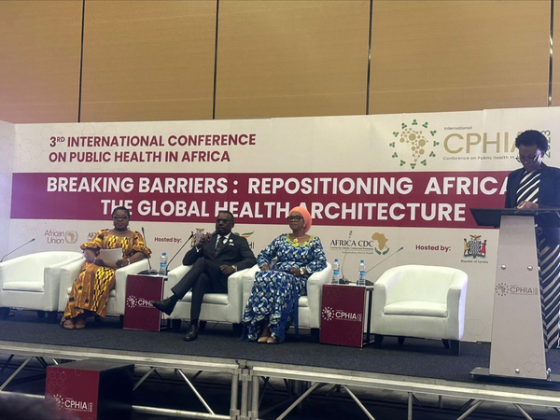African Leaders Urge to Invest in Vaccine Production

The director general of the Africa Centre for Disease Control and Prevention (CDC) has called on African governments to invest more in vaccine production and innovations that help countries battle public health crises.
Dr. Jean Kaseya recalled that during the COVID-19 pandemic, there were inequalities in vaccine distribution from the West because Africa was not producing vaccines to help its citizens fight COVID-19 pandemic.
“This greater autonomy is essential to reducing the inequalities we’ve faced historically, including with the recent rollout of COVID-19 vaccines. We must continue investing in this innovation and production,” he said.
According to him, Africa is faced with a significant burden of diseases such as malaria, tuberculosis, and HIV/AIDS, which contribute to an annual loss of over 227 million healthy life years, with an economic cost exceeding $800 billion.
“The top killers in Africa remain acute respiratory infections, HIV/AIDS, diarrhoea, malaria, and tuberculosis, collectively accounting for 80% of the infectious disease burden, claiming over 6 million lives each year.”
Dr. Kaseya made the call in his opening remarks at the just embed 3rd International Conference on Public Health in Africa (CPHIA) in Lusaka, Zambia. He said, “Needless to say the COVID-19 pandemic heightened the continent's health struggles, resulting in over 250,000 lives lost and more than 12 million reported cases.”
Hosted by the Zambia National Public Health Institute (ZNPHI), and organized by the Africa Centres for Disease Control and Prevention (Africa CDC), with support from the Africa Union (AU), the four-day conference under the theme “Breaking Barriers: Repositioning Africa in the Global Health Architecture spotlighted cutting-edge research and innovations, and present African-led solutions to public health challenges.
“CPHIA 2023 could not be happening at a more important time. African countries have shown extraordinary resilience in the face of recent disease outbreaks, including Ebola, cholera, malaria and COVID-19. We have showed the world what this continent is truly capable of with fast action and strong leadership,” Dr. Kaseya,
“Africa faces over 100 disease outbreaks every year, translating to an average of 2 outbreaks a week. Outbreaks of diseases like monkeypox and Lassa fever are posing serious threats to our already overburdened health systems and our economies. Pandemic prevention, preparedness and response (PPPR) is among the top priorities of the Africa CDC. We are supporting Member States to build agile and efficient response mechanisms.”
Heads of State, ministers of health, scientists, innovators and researchers are highlighting gains impact and challenges made on the public in Africa.
The CPHIA, which began in 2021 virtually due to the COVID-19 pandemic and in person in 2022 drew more than 2,800 participants to Kigali, Rwanda, and an additional 11,625 online. This year’s conference focuses on vaccine financing and manufacturing, quality healthcare for women and girls, and the impact of climate change on health.
“Needless to say that the COVID-19 pandemic heightened the continent's health struggles, resulting in over 250,000 lives lost and more than 12 million reported cases,” Dr. Kaseya noted.
According to him, Africa faces over 100 disease outbreaks every year, translating to an average of 2 outbreaks a week. “Outbreaks of diseases like monkeypox and Lassa fever are posing serious threats to our already overburdened health systems and our economies.”
“Pandemic prevention, preparedness and response (PPPR) are among the top priorities of the Africa CDC.“At the same time, we’re facing a significant burden of disease. Illnesses, such as malaria, tuberculosis, and HIV/AIDS, contribute to an annual loss of over 227 million healthy life years, with an economic cost exceeding $800 billion. The top killers in Africa remain acute respiratory infections, HIV/AIDS, diarrhoea, malaria, and tuberculosis, collectively accounting for 80% of the infectious disease burden, claiming over 6 million lives each year.”
Prof. Senait Fisseha, CPHIA 2023 Co-Chair and Vice President of Global Programs, Susan Thompson Buffett Foundation, said ‘’CPHIA started during the COVID-19 pandemic – a pivotal time for Africa and the world. Coming together virtually in 2021 and in person in 2022, we shared lessons and approaches that saw us through the pandemic, and we have emerged stronger as a continent. CPHIA 2023 will build on these foundations, elevating African voices and solutions to create strong, responsive, and resilient health systems in Africa.’’
“Building on the success of CPHIA 2021 and 2022, this year’s convening will show how African researchers and health leaders are leveraging scientific research and innovations to develop groundbreaking solutions to long-standing challenges – and generating critical lessons from which the rest of the world can learn,’’ said Prof. Margaret Gyapong, CPHIA 2023 Co-Chair and Director of the Institute of Health Research, University of Health and Applied Sciences.”
